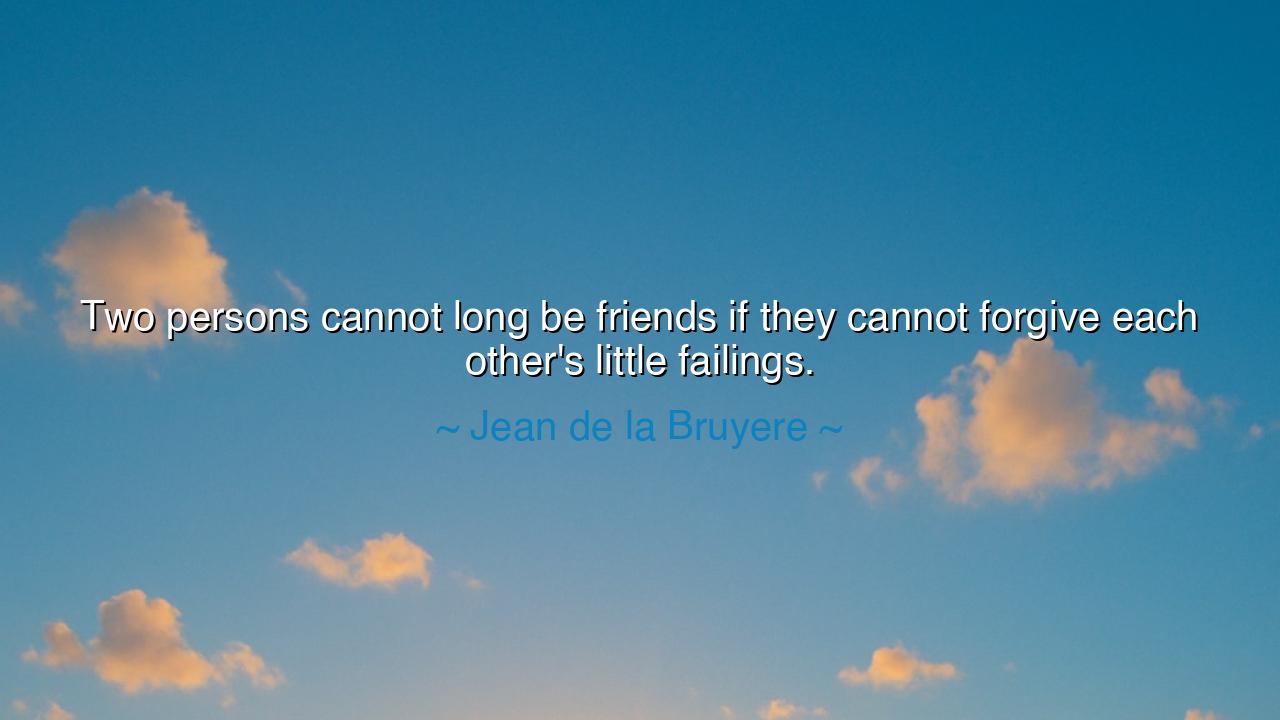
Two persons cannot long be friends if they cannot forgive each
Two persons cannot long be friends if they cannot forgive each other's little failings.






"Two persons cannot long be friends if they cannot forgive each other's little failings." Thus wrote Jean de La Bruyère, the keen moralist of 17th-century France, whose insights into human nature were as sharp as the light of dawn breaking over shadow. In this brief and measured saying, La Bruyère captures a truth as old as companionship itself: that forgiveness is the lifeblood of friendship, and that without mercy for the small imperfections of others, even the strongest bond will wither. For though love and loyalty may begin a friendship, it is forbearance — the quiet art of understanding and forgiving — that allows it to endure.
La Bruyère lived in an age of courtiers, where pride was prized and appearances ruled the heart. He saw how easily alliances crumbled over vanity, and how few souls had the humility to overlook an offense. From this world of fragile manners and concealed ambition, he drew a lesson that still speaks to us: that human nature, being fallible, demands compassion from those who would walk together through life. A friendship between two perfect beings would need no forgiveness — but no such beings exist. To love or befriend another human soul is to live in the presence of imperfection, and to remain despite it.
It is a gentle yet powerful truth — that forgiveness is not weakness, but wisdom. For every friendship is a dance between two hearts that stumble as they move. One forgets, another misunderstands; one speaks too sharply, the other withdraws. And yet, if both can forgive — not grudgingly, but freely — their bond grows stronger for it. Like gold tempered by fire, friendship purified by forgiveness becomes both softer and more enduring. To forgive, then, is not to ignore another’s fault, but to remember one’s own humanity.
Consider the friendship of Samuel Johnson and James Boswell, two men as different as night and day. Johnson was gruff, brilliant, often impatient; Boswell was erratic, impulsive, full of vanity. Yet despite their clashes, their bond endured for decades. Johnson scolded, Boswell sulked, and still they forgave one another, bound by affection and respect. In the end, it was Boswell who immortalized Johnson’s greatness, and Johnson who, despite all his complaints, confessed a deep love for his companion. Their friendship, though far from tranquil, stands as a living proof of La Bruyère’s wisdom: it survived not because they were flawless, but because they forgave.
Indeed, history shows that those who cannot forgive remain forever alone. The philosopher Seneca once wrote, “To err is human; to persist in error is devilish.” Yet to demand perfection of others is its own error — a cruelty disguised as virtue. A friendship that allows no mistake is a fragile glass vessel; it may glitter for a time, but one small crack will shatter it. The truly wise friend is like a gardener who knows that weeds will grow among flowers, and yet still tends the garden with care, knowing beauty is worth the effort.
La Bruyère’s saying also carries a quiet challenge: to look not only outward, but inward. How often do we ourselves wound without knowing? How often do we crave understanding, yet withhold it from others? Forgiveness must be mutual, or friendship cannot live. For friendship is a covenant between two souls — each promising to see the other not as perfect, but as precious. To forgive is to honor that covenant, to say, “I know you are flawed, as I am — and I choose you still.”
Lesson: Friendship is not sustained by harmony alone, but by forgiveness — by the daily practice of patience, humility, and understanding. To expect perfection is to kill love; to forgive is to keep it alive.
Practical action: When a friend fails you, remember your own failings. Speak gently, for words once released cannot be recalled. Choose compassion over pride, and when forgiveness is needed, give it freely, not as a favor, but as an offering of love. Nurture your friendships as living things — fragile yet capable of great strength. For as Jean de La Bruyère teaches, only those who forgive can walk side by side through the long seasons of life, their bond deepened not by perfection, but by grace.






AAdministratorAdministrator
Welcome, honored guests. Please leave a comment, we will respond soon